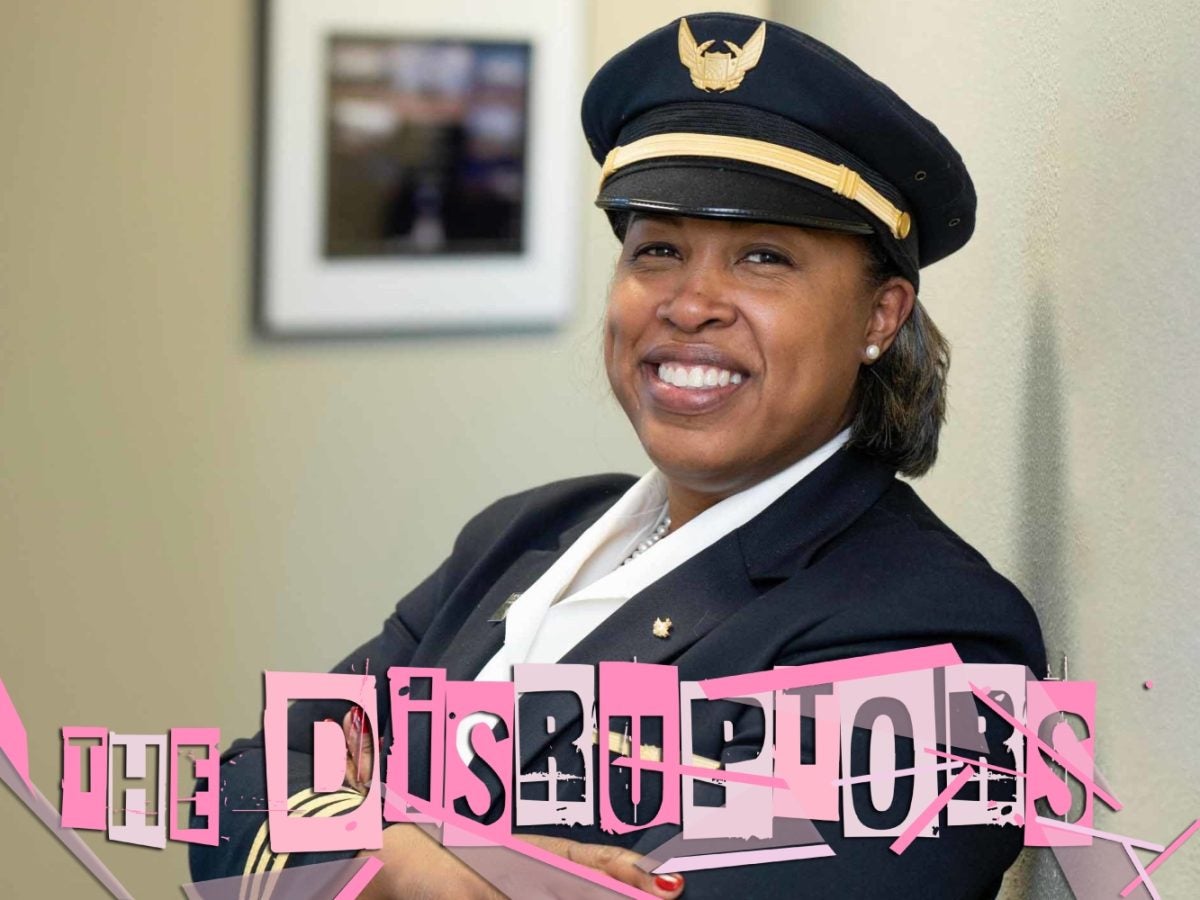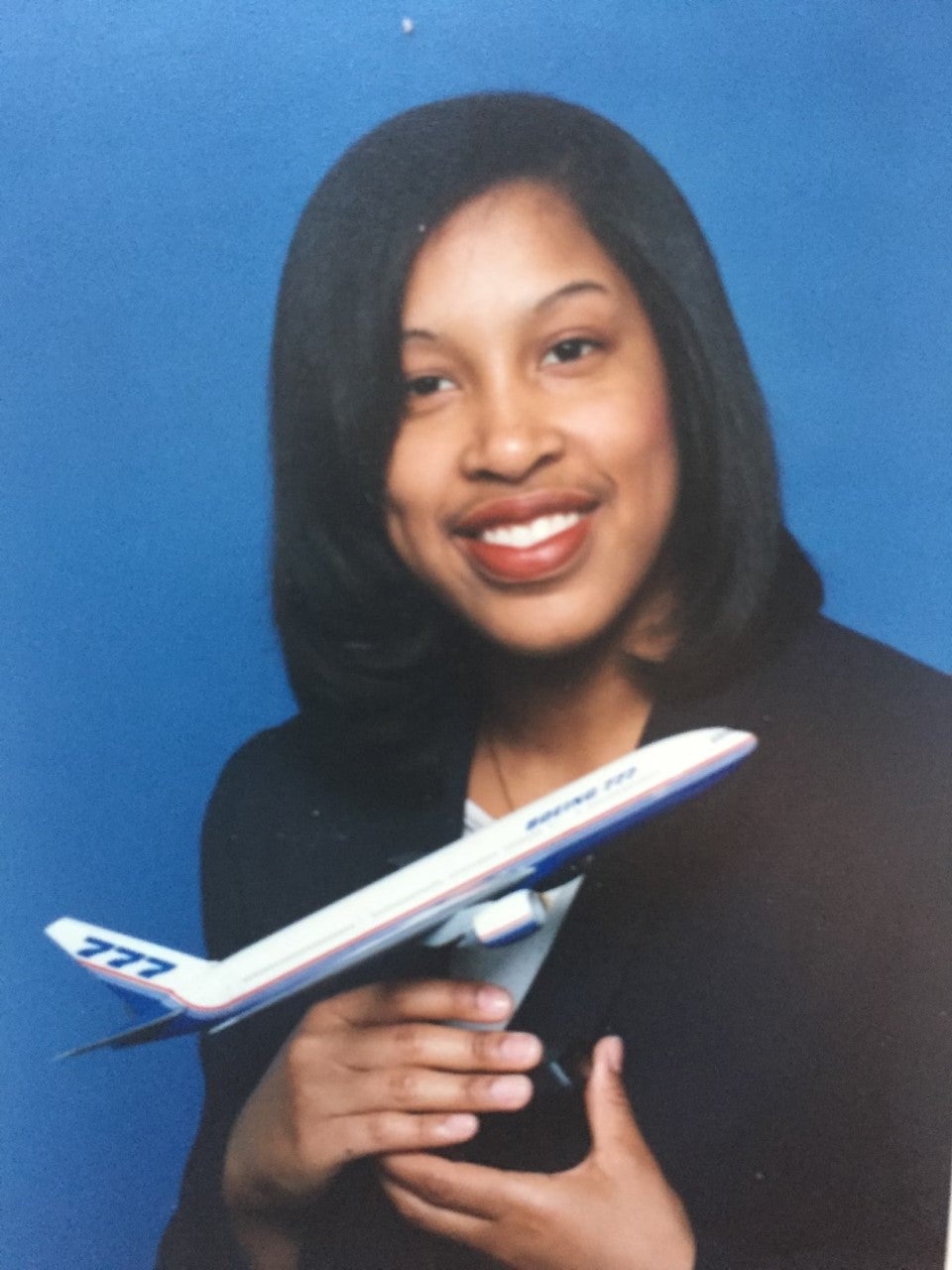
The Disruptors is a series for Women’s History Month spotlighting Black women who are opening doors in spaces that aren’t often filled with women who look like us. These are their stories of how they took up space and are making an impact for those coming behind them.
Some of Captain Nia Gilliam-Wordlaw‘s earliest memories of planes are of them taking off around her neighborhood. A Chicago native who grew up near O’Hare International Airport, she watched in awe as they soared into the sky.
“I just really enjoyed watching planes flying overhead because they’re so awesome. Even to this day, I just look up any time a plane is flying overhead, I just have to see it,” she tells ESSENCE. “I was 10 years old and just always saw airplanes and wanted to know where they were going. And I’m like, ‘I want to fly them, wherever they’re going.'”
Those moments are what fueled her love of aviation. She would go on to learn about Bessie Coleman when her mom shared an article with her about the late aviatrix. “I often say she was my first mentor,” Gilliam-Wordlaw says.
“I just looked to her for inspiration. Man, if she could do this, there’s no reason I can’t. And that’s when it started evolving to something more than just, ‘Oh, that is so cool. Planes are cool’ to ‘I want to be a pilot. This is something that actually can be done, and this is what I’m going to do.'”
It was a dream that she has since made into a reality. The 47-year-old is a first officer, which is a pilot, who in addition to the main flight captain, commands an airplane. She went from taking a picture with a Boeing 777 plane while an intern for United Airlines in 1997, to now being a Houston-based pilot for that same airline.
Making that dream come true was no simple feat, and it could sometimes be lonely. She would often be “the only woman, the only Black person or both” in her classes in college. That original internship didn’t initially pan out into a job for her. And when it came to finding mentors who looked like her, she, for a long time (seven years specifically), had to look to the dead. In addition to Bessie Coleman, Gilliam-Wordlaw found inspiration from a woman named Janet Harmon Braggs. She was one of the first Black female aviators to hold a commercial pilot’s license. Then a teenager, she learned about Braggs, also from Chicago, after a high school teacher gave her the woman’s obituary from a newspaper article and encouraged Gilliam-Wordlaw to attend the funeral the next day.
“I didn’t understand any of that, but I knew that she was a woman who looked like me who was a pilot,” she says. “I’d never met her before and she was deceased. But I’m like, I have to go to this funeral to see somebody that looks like me because representation matters.”
At that homegoing, she would meet Stayce Harris, the current Inspector General of the Air Force, who then introduced her to Theresa Claiborne, the first Black woman to become a U.S. Air Force pilot. It took years for her to meet these women. This struggle inspired her to create the nonprofit Sisters of the Skies (SOS) in 2016 with former U.S. Coast Guard pilot Angel Hughes, whom she met on Facebook, in the hopes of ushering in more Black women aviators.
“We were both trying to figure out, well, how many sisters are in the military? Because she was in the military when we met. And she’s like, ‘How many sisters are over there at United?’ And between the two of us, I think there were five we named. It was just such a small number that it was like, ‘We have to do something. Let’s just start trying to connect everybody.'”
What started as a platform to help the women network became a way to let other young women of color know the possibilities available to them in the aviation industry.
“You just want to help the next person and you want to get more representation because it’s a really cool job,” she says. “And if you don’t see yourself in these positions, sometimes you just don’t even look in that area. ‘Well, I don’t feel included over here. Nobody’s over here, maybe there’s a reason for that.’ Somebody has to start it. Then you just keep bringing the next person in.”

With the help of her organization, Gilliam-Wordlaw sees a lot more representation than she did when she started in the industry. It’s been a major victory for her. An even bigger victory is her recently overcoming breast cancer. Early detection, along with the decision to undergo a double mastectomy, saved her life. As she awaits reconstruction surgery, she’s been grounded from flying since her diagnosis in June of 2022. She believes after she heals from that procedure, she’ll be back to work in a few months. For now though, she’s using her platform with Sisters of the Skies to not only encourage interest in being a pilot to Black women, but to also push them to prioritize their health.
“I found out that one in eight women will be diagnosed with cancer. My breast oncologist informed me of that. That was surprising. That’s how commonplace it is,” she says. “We have to take care of ourselves. We have to go get our mammograms regularly. Because that’s the only way to prevent it.”
“I had an opportunity to use the Sisters of Skies platform to discuss health and wellness and talk about my story,” she continues. “There were some questions. One of my members, she’s scared to get a mammogram. She just doesn’t want to go. You hear, ‘Oh, it hurts.’ You know what hurts a lot more? Having to go through a double mastectomy; having to go through surgeries; having just to hear those words, ‘You have cancer.'”
Though her focus currently is on healing, Gilliam-Wordlaw is looking forward to being back in the cockpit. Her travels have taken her all over the world. She hopes to see Australia, Lagos, Nigeria, Cape Town, South Africa and the Maldives next.
“I still have lots of places to go,” she says.
And she still has work to do to open up the door further to more Black women pilots down the line. Getting to be the example she struggled to find growing up has a profound effect on her.
“It really means the world to me. It’s like my everything,” Gilliam-Wordlaw says. “It’s my purpose and I feel like I’m fulfilling it. That’s what it truly means. What’s your passion? What moves you? What wakes you up? What is it that gets you going? If you find your passion, then your passion will lead you to your purpose. And that’s really all I’ve done. I just took my passion, I came out here and I exposed it to others. That’s my purpose.”